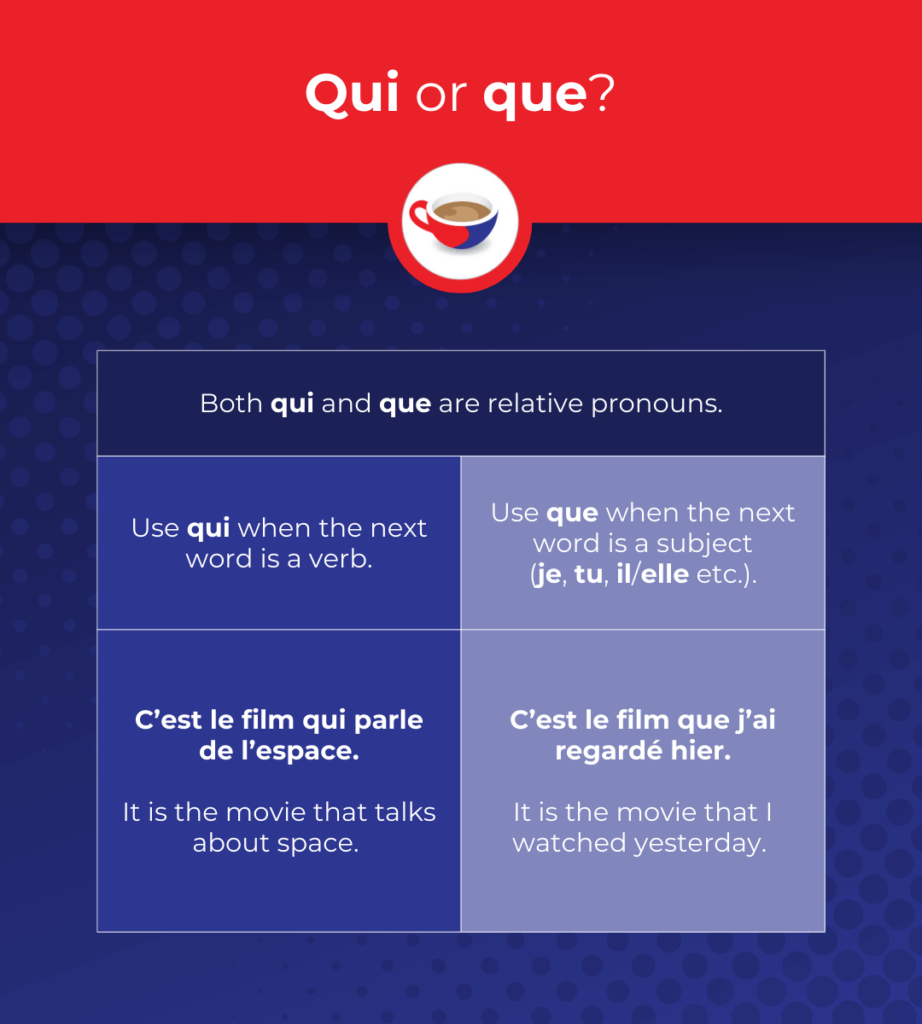Knowing when to use qui and when to use que is a tricky topic for many French learners.
In this article we’re going to practise qui and que to help you know when to use each of them.
The Coffee Break French Show is a podcast series of bite-sized, friendly conversations, in which we demystify tricky French language topics. In the latest episode, Mark and Max continue their discussion of qui and que and how to choose between them when speaking French. This episode is the second part of a double episode on this topic. So, before we start, if you haven’t already watched our other episode on this topic, or read its accompanying blog article, you can find it here.
Continue reading to find out more and why not listen to the podcast as you go?
Let’s start with a quick recap.
‘Qui’ replaces a subject
When replacing a subject, qui connects actions to the subject. For instance, pay attention to how qui is used to connect the following sentences:
Je téléphone à mon ami. Mon ami habite à Londres.
I’m phoning my friend. My friend lives in London.
Je téléphone à mon ami qui habite à Londres.
I’m phoning my friend who lives in London.
‘Que’ replaces a direct object
Que, on the other hand, replaces a direct object. Let’s compare the following sentences to see how que can be introduced in order to link two sentences:
J’ai mangé un gâteau. Le gâteau est au chocolat.
I’ve eaten a cake. The cake is a chocolate cake.
Le gâteau que j’ai mangé est au chocolat.
The cake that I’ve eaten is a chocolate cake.
And remember, when the word following que starts with a vowel, que becomes qu’.
Let’s practise ‘qui’ and ‘que’
In this podcast episode, Mark and Max put theory into practice with a fill-in-the-gaps exercise. Let’s have a look at the text they tackle:
J’ai un ami _ habite dans une petite maison _ j’adore visiter. Il a un chien _ je trouve très mignon. Le chien, _ j’ai rencontré hier, est très joueur. Mon ami, _ est passionné par la musique, joue du piano _ ses parents lui ont offert. Il a une sœur _ je connais depuis l’enfance. Sa sœur, _ est médecin, travaille dans un hôpital _ je n’ai jamais visité. Mon ami et sa sœur ont des parents _ sont très sympathiques. Les parents, _ j’ai rencontrés hier soir, m’ont invité à dîner ce week-end. C’est une famille _ j’apprécie énormément.
Our tip is that when you find yourself in a situation where you have to pick between qui and que, the very next word can help you make your choice. If the word that follows is a subject (e.g. je, tu, il, mon frère, Jeanne et Serge), choose que. If the next word is a conjugated verb or a pronoun, it is most likely to be qui.
Have a go at making the paragraph flow more naturally by using qui and que. You can check your answers at the end of this blog article, along with the English translation.
In conclusion
Remember, when faced with the choice between qui and que, let the context guide you. It may help you to memorise pairs of examples, like the ones used in this episode.
If you found this post interesting, make sure to listen to the full episode with Mark and Max on The Coffee Break French Show. This is the series in which we look at a range of topics for French learners, so make sure to subscribe to our podcast feed or our channel on YouTube.
Plus! To get regular free French lessons in your inbox, you can sign up for our short (coffee-break-sized) email lessons that will help you improve your French. You will also hear from Mark, the founder of Coffee Break Languages, giving advice for language learners at any level. Sign up below!
Don’t worry if you make mistakes with qui and que, French speakers will still understand you. The important thing is to practise and you will improve. Embrace the learning process, practise regularly, and soon, the distinctions between qui and que will become second nature.
Happy Coffee Breaking!
PS. Here is the full paragraph with the gaps completed with qui and que:
J’ai un ami qui habite dans une petite maison que j’adore visiter. Il a un chien que je trouve très mignon. Le chien, que j’ai rencontré hier, est très joueur. Mon ami, qui est passionné par la musique, joue du piano que ses parents lui ont offert. Il a une sœur que je connais depuis l’enfance. Sa sœur, qui est médecin, travaille dans un hôpital que je n’ai jamais visité. Mon ami et sa sœur ont des parents qui sont très sympathiques. Les parents, que j’ai rencontrés hier soir, m’ont invité à dîner ce week-end. C’est une famille que j’apprécie énormément.
Here’s an English translation:
I have a friend who lives in a small house that I love to visit. He has a dog whom* I find very cute. The dog, whom I met yesterday, is very playful. My friend, who is passionate about music, plays the piano that his parents gave him. He has a sister whom I have known since childhood. His sister, who is a doctor, works in a hospital that I have never visited. My friend and his sister have parents who are very friendly. The parents, whom I met last night, invited me to dinner this weekend. It’s a family that I greatly appreciate.
*Note that while “whom” is strictly the correct word to use when referring to the object of the sentence in English, outside formal contexts we very often hear “who” being used instead nowadays.




